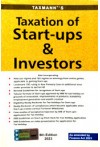- Publisher: Taxmann
- Edition: 6 Ed 2023
- ISBN 13 9789356227453
- Approx. Pages 636 + Contents
- Format Paperback
- Approx. Product Size 24 x 16 cms
- Delivery Time Normally 7-9 working days
- Shipping Charge Extra (see Shopping Cart)
............................................................................................
Description
Incorporating
» New tax regime and TDS regime on winnings from online games, applicable to gaming Start-ups
» Landmark ITAT ruling in Raw Pressery Case on additional onus under provisos to section 68
» Revised Guidelines for Recognition of Start-Ups
» Tabular formats of Stat-ups Approved by IMB for tax Holiday on Ground of Innovation,
Improvements in Products, Scalability, employment generation and wealth Creation
» Eligibility Ready Reckoner for tax holidays for start-ups
» Ready Reckoner of compliances which become applicable when start up crosses various
turnover milestones
» Case studies of acceptance/ rejection by IMB of start up's application for tax holiday
» IMB Guideline on start-up pitch deck for tax holiday application
» IMB Guidelines on video presentation for application for tax holiday
............................................................................................
Contents
Chapter 1 : What is a start-up
Chapter 2 : Distinction between start-ups and MSMEs
Chapter 3 : What is the criteria for recognition of start-ups by DPIIT
Chapter 4 : Start-ups eligible for DPIIT-Recognition
Chapter 5 : OPC as a start-up entity
Chapter 6 : Innovation/scalable business model
Chapter 7 : Start-up entities not eligible for DPIIT recognition
Chapter 8 : Sole proprietorships – whether eligible for DPIIT recognition
Chapter 9 : Entities formed as a result of amalgamations/mergers/demergers/absorption whether
eligible for DPIIT recognition
Chapter 10 : Entities formed as a result of compromise/arrangement – whether eligible for DPIIT
recognition
Chapter 11 : Holding & subsidiary companies – whether eligible for DPIIT recognition
Chapter 12 : Joint Ventures – whether eligible for DPIIT recognition
Chapter 13 : Entities incorporated outside India – whether eligible for DPIIT recognition
Chapter 14 : Entities with foreign shareholding/stake – whether eligible for DPIIT recognition
Chapter 15 : Entities formed by splitting up/reconstruction of an existing business – whether eligible
for DPIIT recognition
Chapter 16 : Entities incorporate with common director/DP/partner – whether eligible for DPIIT recognition
Chapter 17 : Procedure for DPIIT-recognition of start-up
Chapter 18 : Name change by DPIIT-recognized start-up entity – whether permitted
Chapter 19 : CIN/LLPIN change by DPIIT-recognized start-up entity – whether permitted
Chapter 20 : Conversion by a DPIIT-recognized entity from one form to another – whether permissible
Chapter 21 : Automatically ceasing to be a 'start-up' under LSN
Chapter 22 : Approvals needed by start-up entity for claiming tax benefits
Chapter 23 : Tax efficacy of different start-up entity forms – firms, LLPs & Pvt. Companies
Chapter 24 : Tax holiday to start-ups under Section 80-IAC
Chapter 25 : Funding blues of private limited start-up companies
Chapter 26 : Exemption from 'angel tax' to private limited companies start-ups
Chapter 27 : Computation of FMV of shares issued when angel tax exemptions is not applicable
Chapter 28 : Conditions for carry forward or set-off of losses of start-up PLC under section 79
Chapter 29 : Deferring TDS or tax payment in respect of ESOP income of employees of eligible start-ups
Chapter 30 : Tax and TDS on winning from online games
Chapter 31 : Mandatory acceptance of payments through prescribed electronic modes if turnover exceeds
INR 50 crores – section 269SU
Chapter 32 : Constitution of dispute resolution committee for small and medium taxpayers
Chapter 33 : Taxation of investors exiting start-ups
Appendices
...........................................................................................

